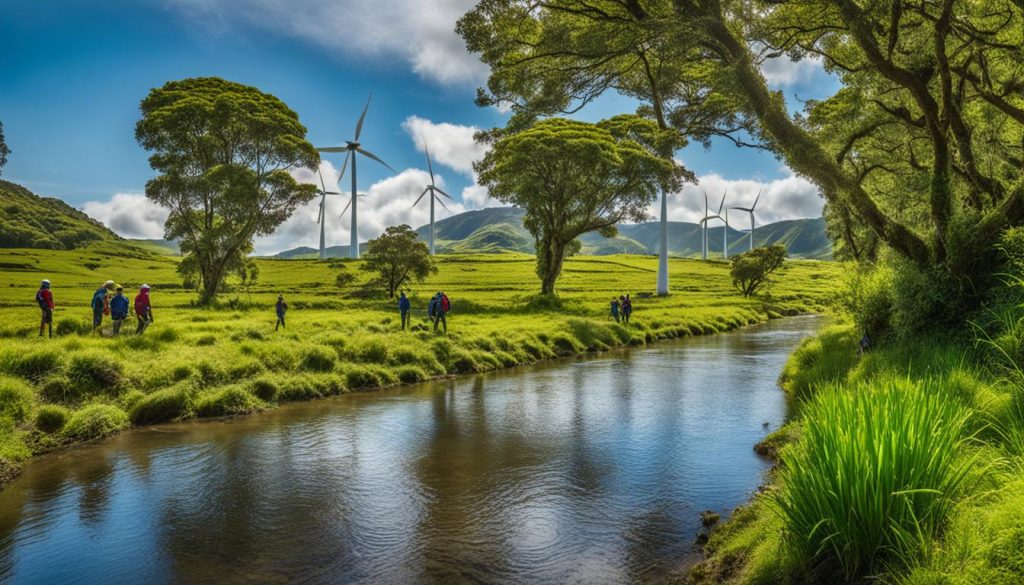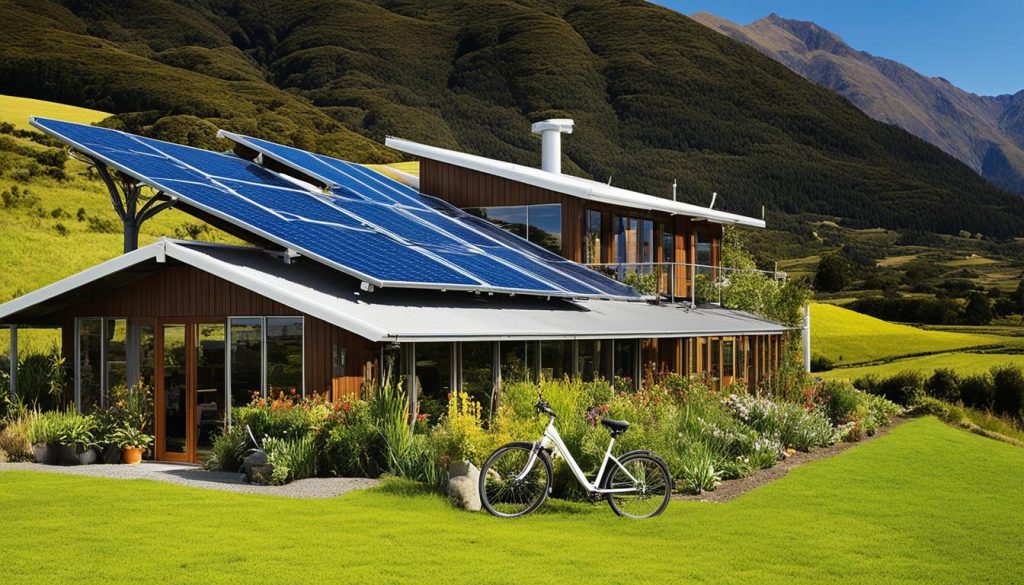Welcome to my series on sustainable living in New Zealand! In this article, I will explore the eco-friendly lifestyle, green living tips, and sustainable practices that make New Zealand a haven for those seeking environmentally conscious choices. From sustainable home design to eco-friendly transportation options, New Zealand offers a wealth of opportunities for individuals to embrace a sustainable lifestyle.
As a migrant in New Zealand, you will find it easy to adapt to the country’s commitment to sustainability. The nation promotes a culture of reducing, reusing, and recycling, making it a natural fit for those looking to make a positive impact on the environment. Additionally, New Zealand is home to numerous sustainability initiatives and resources that can support your journey towards sustainable living.
Key Takeaways:
- New Zealand promotes sustainable living practices and offers numerous opportunities for individuals to embrace an eco-friendly lifestyle.
- Sustainability initiatives and resources are readily available to support migrants in making environmentally conscious choices.
- Sustainable home design, eco-friendly transportation options, and sustainable agriculture practices are key focus areas in New Zealand.
- By adopting sustainable practices, migrants can contribute to New Zealand’s commitment to a greener future.
- Exploring national parks and participating in conservation projects are great ways to connect with nature in New Zealand.
Embracing the Kiwi Lifestyle
New Zealanders have long been champions of sustainable living. Embracing the Kiwi lifestyle means wholeheartedly adopting eco-friendly practices and nurturing a deep sense of environmental consciousness. By following the “reduce, reuse, and recycle” mantra, Kiwis actively contribute to the preservation of our planet.
One of the core principles of the Kiwi way of life is energy efficiency. By prioritizing energy conservation and making conscious choices to minimize wastage, New Zealanders lead by example in sustainable living.
In addition, embracing the Kiwi lifestyle involves choosing eco-friendly transportation options. Walking, cycling, and utilizing public transportation systems are highly encouraged, reducing carbon emissions and promoting a greener environment.
“New Zealanders understand that preserving our environment is not an option, but a responsibility. By embracing sustainable practices in our daily lives, we can create a better future for generations to come.”
Migrants who choose to adopt these principles and embrace the Kiwi lifestyle will find it easy to integrate into New Zealand’s environmentally conscious society. They will become part of a vibrant community that values sustainability and cherishes our natural resources.
Sustainable Housing
When it comes to sustainable living in New Zealand, finding the right housing plays a crucial role. As migrants, we can contribute to a greener future by choosing eco-friendly homes that prioritize energy efficiency, water conservation, and renewable energy sources.
One of the key elements to consider when searching for sustainable housing is energy-efficient heating. Well-insulated homes with efficient heating systems reduce energy consumption and minimize the ecological footprint. By opting for homes equipped with energy-efficient heating, we can stay warm while minimizing our impact on the environment.
Water conservation is another important aspect of sustainable housing. To promote water conservation in New Zealand, it is essential to install water-saving fixtures such as low-flow showerheads, faucets, and toilets. These simple changes can significantly reduce water consumption and contribute to sustainable living.
Additionally, practicing sustainable gardening methods can further enhance the sustainability of our homes. By implementing rainwater harvesting systems, using compost for soil enrichment, and choosing native plants that require less water, we can create eco-friendly and beautiful outdoor spaces.
“Sustainable housing ensures a comfortable and eco-friendly living environment, promoting a greener future for New Zealand.”
Creating sustainable homes involves making conscious choices that align with our commitment to the environment. By considering the energy efficiency, water conservation, and sustainable gardening practices, we can contribute to sustainable living in New Zealand, while enjoying a comfortable and eco-friendly lifestyle.
| Benefits of Sustainable Housing | Actions for Sustainable Living |
|---|---|
| 1. Reduced energy consumption | 1. Install energy-efficient heating systems |
| 2. Lower utility bills | 2. Use water-saving fixtures |
| 3. Minimized ecological footprint | 3. Practice sustainable gardening methods |
| 4. Improved indoor air quality | 4. Opt for renewable energy sources |
Eco-Conscious Consumption
Being mindful of consumption habits is essential for sustainable living in New Zealand. As a migrant, I have discovered several ways to make eco-conscious choices and reduce my environmental impact. Here are some key practices that I have embraced:
Supporting Local Farmers and Businesses
By buying local and organic, I not only prioritize my health but also support sustainable agricultural practices. Local farmers and businesses focus on minimizing their carbon footprint and preserving the environment while providing fresh and high-quality products.
Reducing Single-Use Plastic
To tackle the issue of single-use plastic waste, I have made a conscious effort to carry reusable bags, water bottles, and coffee cups. By saying no to plastic bags and disposable containers, I contribute to the reduction of plastic pollution in New Zealand’s beautiful landscapes and oceans.
Conscious Fashion Choices
Another aspect of eco-conscious consumption is making mindful fashion choices. I support sustainable clothing brands that prioritize ethical production practices and use eco-friendly materials. Additionally, opting for second-hand clothing reduces waste and extends the lifespan of fashion items.
“Eco-conscious consumption allows us to align our values with our everyday choices, making a positive impact on the environment while supporting local communities.”
By adopting these practices, I actively contribute to a more sustainable future in New Zealand. My eco-conscious decisions not only benefit the environment but also inspire others to make mindful choices, creating a collective movement towards a greener and more eco-friendly society.
Connecting with Nature
Immersing oneself in New Zealand’s awe-inspiring natural landscapes is an integral part of sustainable living. By connecting with nature, migrants can develop a deeper appreciation for the environment and contribute to conservation efforts. Exploring national parks, participating in conservation projects, and practicing Leave No Trace principles are all ways to engage with the natural world around us.
Exploring National Parks
New Zealand is renowned for its breathtaking national parks, which offer a wealth of opportunities for outdoor activities and wildlife encounters. From the pristine fjords of Fiordland National Park to the volcanic wonders of Tongariro National Park, there is no shortage of natural wonders to explore. Hiking, camping, and nature photography are popular activities that allow individuals to immerse themselves in the beauty of these protected areas.
Participating in Conservation Projects
Volunteering for local conservation projects is a meaningful way to contribute to the preservation of New Zealand’s unique ecosystems. Joining forces with dedicated organizations and community groups, migrants can actively contribute to ecological restoration efforts such as tree planting initiatives and beach clean-ups. By engaging in these projects, individuals can make a tangible difference in protecting and enhancing the natural environment.
“Conservation is a state of harmony between people and land.” – Aldo Leopold
Leave No Trace Principles
Practicing Leave No Trace principles ensures that our interactions with nature have minimal impact on the environment. Whether hiking, camping, or engaging in other outdoor activities, it is essential to leave natural areas as we found them. This means disposing of waste responsibly, respecting wildlife and their habitats, and being mindful of our footprint on the ecosystem. By adopting these principles, we can enjoy the beauty of nature while preserving it for future generations.
Connecting with nature is not only a source of personal fulfillment but also a vital component of sustainable living. By immersing ourselves in the natural wonders of New Zealand, participating in conservation projects, and practicing Leave No Trace principles, we can foster a deep appreciation for the environment and contribute to its long-term preservation.
Engaging with the Community
Building connections and engaging with the local community is crucial for sustainable living in New Zealand. As an eco-conscious migrant, there are several ways you can get involved and make a positive impact. Here are some ideas:
Join Community Gardens
Community gardens are a fantastic way to get your hands dirty and grow your own food while fostering a sense of community. You can collaborate with like-minded individuals, exchange gardening tips, and learn from experienced gardeners. Not only will you enjoy the fruits of your labor, but you’ll also contribute to greening your neighborhood and promoting local food production.
Attend Sustainability Events, Workshops, and Seminars
To stay informed and gain valuable insights into sustainable living, make it a point to attend sustainability-focused events, workshops, and seminars. Here, you can learn from experts in the field, discover innovative solutions, and connect with other individuals who share your passion for a greener future. These events provide a platform for knowledge exchange and networking, allowing you to engage with like-minded individuals and expand your sustainable living network.
“Attending sustainability-focused events, workshops, and seminars provides opportunities to learn from experts and connect with like-minded individuals.”
Volunteer for Local Environmental Organizations and Initiatives
Volunteering is a powerful way to give back to the community and make a meaningful impact on the environment. Local environmental organizations and initiatives are always in need of enthusiastic volunteers who can contribute their time and skills to various projects. Whether it’s participating in beach clean-ups, tree planting initiatives, or conservation projects, your efforts will contribute to preserving the natural beauty of New Zealand and creating a more sustainable future for all.
Engaging with the community not only allows you to actively participate in sustainable initiatives but also provides the opportunity to connect with like-minded individuals who are passionate about making a difference. By joining community gardens, attending sustainability events, workshops, and seminars, and volunteering for local environmental organizations, you’ll be an integral part of the sustainable living movement in New Zealand.

New Zealand’s Commitment to Sustainability
New Zealand is a leading proponent of sustainable practices and is dedicated to creating a carbon-neutral future. The country has set a target to achieve carbon neutrality by 2050 and has implemented various initiatives to reduce greenhouse gas emissions and promote sustainable living.
One significant aspect of New Zealand’s sustainability efforts is the promotion of sustainable agriculture practices. The country recognizes the importance of sustainable farming methods and is actively working to reduce the environmental impact of agriculture. By adopting innovative techniques and embracing organic farming practices, New Zealand aims to foster a more sustainable and ecologically conscious food system.
Companies in New Zealand are also taking steps towards achieving sustainability goals. Many businesses are striving to obtain carboNZero certification, which recognizes their commitment to measuring, managing, and reducing their carbon emissions. These initiatives reflect the collective effort and dedication of New Zealand’s industries towards building a more sustainable future.
Conservation and Endangered Species Management
I am fortunate to live in a country that is at the forefront of species management and conservation. New Zealand’s commitment to preserving its unique flora and fauna has resulted in successful efforts to bring endangered birds and animals back from the brink of extinction.
One of the remarkable initiatives in New Zealand is the Kiwi Encounter, a special breeding facility dedicated to the conservation of the iconic kiwi bird. Here, dedicated conservationists work tirelessly to hatch and raise kiwi chicks, ensuring their survival and eventual release into protected areas.
ZEALANDIA is another outstanding example of New Zealand’s commitment to protecting its native species. This predator-free sanctuary provides a safe haven for endangered wildlife, allowing them to thrive in their natural habitat. Visitors to ZEALANDIA have the opportunity to observe these incredible creatures up-close and learn about the ongoing conservation efforts.
I believe that these initiatives not only showcase the importance of conservation in New Zealand but also inspire individuals around the world to take action and protect our planet’s precious biodiversity.
To illustrate the impact of these conservation efforts, here is a table showcasing some of New Zealand’s notable endangered species and the successful conservation measures implemented to save them:
| Endangered Species | Conservation Measures |
|---|---|
| Rowi (Okarito Brown Kiwi) | Intensive predator control, habitat restoration, captive breeding, and release programs. |
| Kākāpō | Comprehensive conservation management, intensive breeding programs, and habitat protection. |
| Takahē | Active predator management, habitat restoration, captive breeding, and translocations to predator-free islands. |
| Black Stilt (Kaki) | Protection of breeding habitats, captive breeding, predator control, and habitat restoration. |
Through these conservation efforts, New Zealand continues to be a global leader in protecting endangered species and preserving its natural heritage.
Witnessing the progress made in conserving endangered species is a testament to the significance of dedicated conservation initiatives in New Zealand. I am proud to be a part of a country that values and prioritizes the protection of its unique wildlife.
Sustainable Travel in New Zealand
When traveling to New Zealand, I believe in making environmentally conscious choices to ensure a sustainable journey. By embracing green travel options, you can reduce your carbon footprint and experience the beauty of this country in an eco-friendly way. Here are some tips for sustainable travel in New Zealand:
Choose Green Transportation
Opt for green transportation options like car sharing, which not only reduces emissions but also allows you to connect with locals and fellow travelers. Embrace the stunning landscapes of New Zealand by exploring on foot through hiking or cycling, immersing yourself in nature while minimizing your impact.
Contribute to Sustainable Farming
“Staying and helping out on a Kiwi farm through programs like Willing Workers on Organic Farms (WWOOF) can be a truly enriching experience. You’ll get hands-on with sustainable farming practices, learn about organic cultivation, and contribute to the local agricultural community.”
Eco-Friendly Activities and Accommodation
Look for activities and accommodation providers certified by Qualmark Enviro. This certification ensures that they meet strict sustainability standards. Whether it’s exploring nature reserves, engaging in wildlife conservation projects, or staying in eco-friendly lodges, Qualmark Enviro-certified options prioritize sustainability.
By practicing sustainable travel in New Zealand, you are not only preserving the natural environment but also supporting local communities and promoting responsible tourism. So, pack your bags and embark on a journey that leaves a positive impact on the places you visit.
Government Initiatives for Sustainability
The New Zealand government is committed to promoting sustainability through various initiatives and policies. By implementing these measures, they aim to create a greener future for the country and mitigate the impacts of climate change. Some key government initiatives for sustainability in New Zealand include:
1. Zero Carbon Act
The Zero Carbon Act is a landmark legislation introduced by the New Zealand government to address climate change. Its primary goal is to achieve carbon neutrality by 2050. Through this act, the government aims to reduce greenhouse gas emissions and transition to a low-carbon economy.
2. Sustainable Transport Projects
The government recognizes the importance of sustainable transportation in reducing emissions and creating a more eco-friendly society. They are prioritizing sustainable transport projects, such as the development of public transport networks and the improvement of walking and cycling infrastructure. These initiatives aim to encourage people to choose low-carbon transport options and reduce reliance on private vehicles.
“The Zero Carbon Act and sustainable transport projects are key pillars of the New Zealand government’s efforts to promote sustainability and combat climate change.”
The government believes that these initiatives will contribute significantly to achieving their sustainability goals and creating a more environmentally conscious nation.
| Government Initiatives | Description |
|---|---|
| Zero Carbon Act | Aims to achieve carbon neutrality by 2050 and reduce greenhouse gas emissions. |
| Sustainable Transport Projects | Focuses on improving public transport networks and walking and cycling infrastructure to promote low-carbon transport options. |
These initiatives reflect the New Zealand government’s commitment to sustainability and their proactive approach towards addressing environmental challenges. The Zero Carbon Act and sustainable transport projects are crucial steps towards creating a greener and more sustainable future for New Zealand.

Challenges and Future Outlook
Despite its commitment to sustainability, New Zealand faces environmental challenges that require attention and action. Two significant issues include farming pollution and the impact of rising sea levels.
“Farming pollution has become a pressing concern in New Zealand, with intensive agriculture practices contributing to water contamination and soil degradation,” says ecologist Dr. Emma Morrison.
The country’s agricultural sector plays a vital role in its economy, but it also poses environmental risks. Excessive use of fertilizers and pesticides can lead to water pollution, affecting both aquatic ecosystems and human health. Efforts are being made by the government and agricultural organizations to implement sustainable farming practices, reduce pollution, and protect natural resources.
Rising sea levels are another challenge faced by New Zealand. The country’s extensive coastline is vulnerable to the effects of climate change, putting coastal communities and infrastructure at risk.
“The rise in sea levels threatens low-lying areas and coastal ecosystems, increasing the frequency and intensity of coastal flooding,” warns coastal scientist Dr. James Carter.
New Zealand’s government has taken action to address this issue, investing in infrastructure improvements, developing coastal management strategies, and raising awareness among communities. Building resilient coastal defenses and adapting to changing environmental conditions are crucial for minimizing the impact of rising sea levels.
To overcome these challenges and ensure a sustainable future, New Zealand focuses on legislation, innovation, and adaptation. The government works collaboratively with various stakeholders, including scientists, environmental organizations, and local communities.
“By continuing to prioritize sustainability and taking proactive measures, New Zealand can preserve its natural beauty and create a resilient, eco-friendly future,” states environmental policy expert Dr. Sarah Anderson.
Conclusion
By embracing sustainable living practices in New Zealand, I can actively contribute to environmental stewardship and help create a greener future. By adopting the Kiwi way of life and making mindful choices, I can integrate into the environmentally conscious society in New Zealand and become part of a community that values sustainability. Sustainable living in New Zealand involves reducing, reusing, and recycling, prioritizing energy efficiency, and embracing eco-friendly transportation options. It also emphasizes sustainable housing, conscious consumption, connecting with nature, and engaging with the community.
With New Zealand’s commitment to sustainability and various initiatives in place, I have the opportunity to make a positive impact. Supporting local businesses, choosing organic and locally sourced products, and reducing single-use plastic are just a few ways I can contribute to a greener future. Exploring national parks, participating in conservation projects, and volunteering for local environmental organizations are excellent avenues for connecting with nature and making a difference.
As I embark on my sustainable journey in Aotearoa, I am excited to be a part of a society that values environmental stewardship. Through my actions, I can help preserve New Zealand’s natural beauty and contribute to the collective effort of building a sustainable and greener future for generations to come.
FAQ
What are some key sustainable living practices in New Zealand?
Key sustainable living practices in New Zealand include reducing, reusing, and recycling, prioritizing energy efficiency, embracing active transportation, supporting local and organic products, reducing single-use plastic, making conscious fashion choices, connecting with nature, and engaging with the community.
What should I look for in sustainable housing in New Zealand?
In sustainable housing, look for energy-efficient homes that are well-insulated and equipped with renewable energy sources. It is also important to consider water conservation measures, such as water-saving fixtures and sustainable gardening methods.
How can I practice eco-conscious consumption in New Zealand?
You can practice eco-conscious consumption in New Zealand by buying local and organic products, reducing the use of single-use plastic by carrying reusable bags, water bottles, and coffee cups, and making conscious fashion choices by supporting sustainable clothing brands and opting for second-hand options.
How can I connect with nature in New Zealand?
You can connect with nature in New Zealand by joining local conservation projects, participating in tree planting initiatives and beach clean-ups, exploring national parks, and practicing Leave No Trace principles while engaging in outdoor activities.
How can I engage with the local community in New Zealand?
You can engage with the local community in New Zealand by joining community gardens, attending sustainability events and workshops, volunteering for local environmental initiatives, and supporting local businesses that promote sustainable practices.
What is New Zealand’s commitment to sustainability?
New Zealand has a strong commitment to sustainability with initiatives such as the Zero Carbon Act, which aims to achieve carbon neutrality by 2050. The country is also focusing on sustainable agriculture practices and promoting renewable energy sources.
What is being done to conserve endangered species in New Zealand?
New Zealand has successful conservation efforts to protect and manage endangered species. Special breeding facilities like Kiwi Encounter and predator-free areas like ZEALANDIA are examples of initiatives that contribute to the conservation of endangered species.
How can I travel sustainably in New Zealand?
You can travel sustainably in New Zealand by choosing green transportation options such as car sharing, hiking, and cycling. Programs like Willing Workers on Organic Farms provide opportunities to learn sustainable skills, and the Qualmark Enviro certification helps identify eco-friendly activities, eateries, and accommodation providers.
What sustainability initiatives has the New Zealand government implemented?
The New Zealand government has implemented initiatives such as the Zero Carbon Act, which aims to achieve carbon neutrality by 2050. The government also prioritizes sustainable transport projects and invests in low-carbon options such as public transport and walking and cycling infrastructure.
What challenges does New Zealand face in terms of sustainability?
New Zealand faces challenges such as farming pollution and the impact of rising sea levels. Efforts are being made to address these challenges through legislation, innovation, and adapting to changing environmental conditions.

